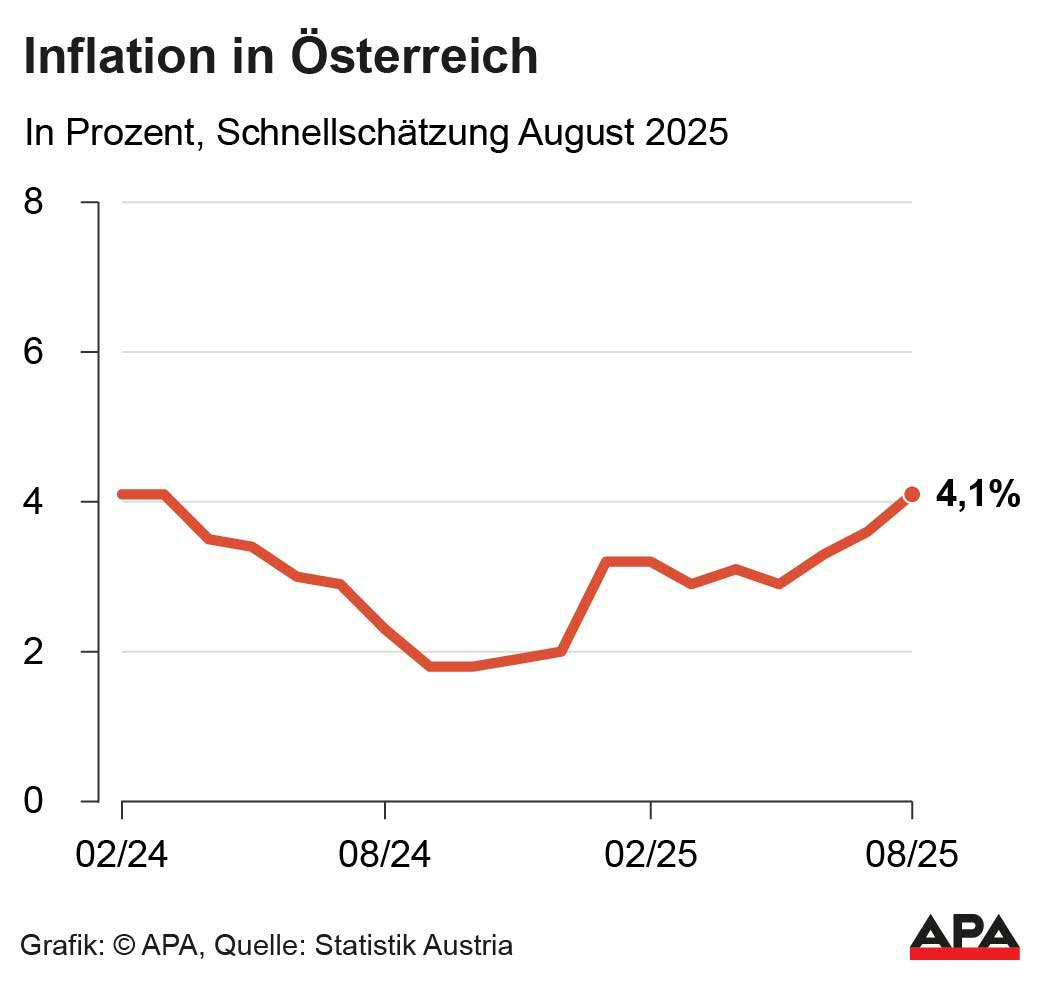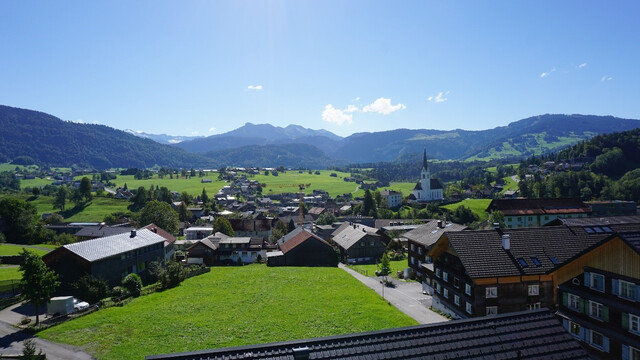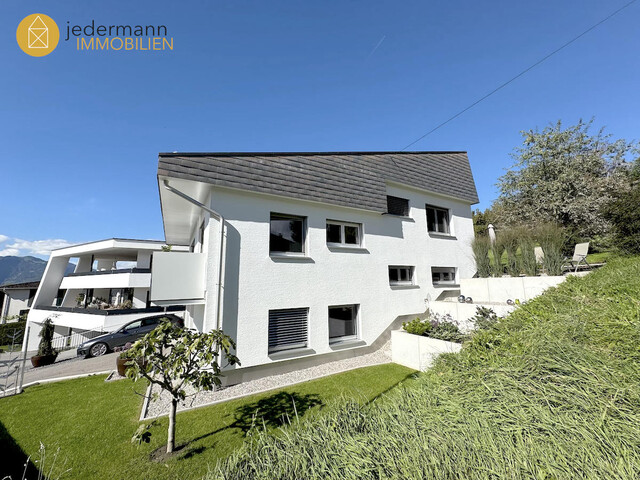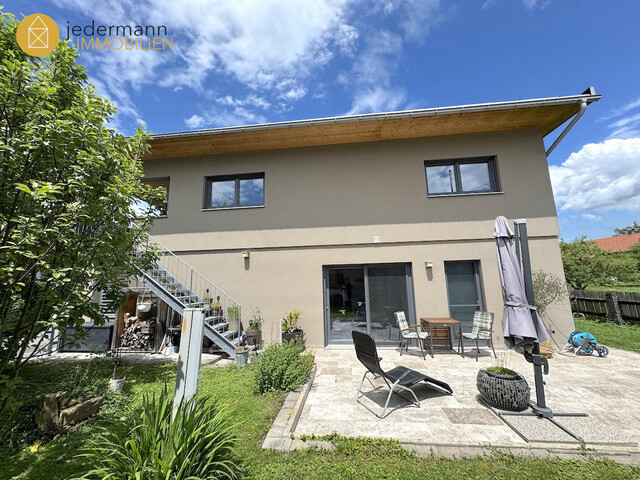Inflation in August Continued to Rise

"This is the highest value since March 2024. Almost all expenditure groups contributed to this increase," said the Director General of Statistics Austria, Manuela Lenk, regarding the inflation in August. In July, the inflation rate was 3.6 percent. The energy sector recorded a particularly strong increase with a plus of 5.9 percent.
Inflation in August: Increase in Electricity Prices and Services
The energy sector in this country recorded a particularly strong increase with a plus of 5.9 percent. On one hand, fuel prices had a significantly less dampening effect on prices than recently, and on the other hand, electricity prices continued to rise. In July, the inflation in energy was still at 4.2 percent. The biggest influence on inflation in August was once again services, which increased by 4.7 percent. This was followed by food, tobacco, and alcohol, whose prices rose by 5.0 percent. Core inflation, consisting of industrial goods and services, was at 3.8 percent in August. In July, the inflation rate year-on-year was still at 3.6 percent. On a monthly comparison, the consumer price index (CPI) rose by 0.2 percent.

The EU-wide comparable harmonized consumer price index (HCPI) for Austria was also at 4.1 percent in August according to the flash estimate, compared to the previous month of July, the index rose by 0.3 percent. In the Eurozone comparison, Austria is thus significantly above the average, with the inflation rate in the 20-country community increasing to only 2.1 percent in August, after 2.0 percent in July. The European Central Bank (ECB) aims for an inflation of 2.0 percent in the medium term, as it considers this level optimal for the economy in the currency community.
Rolling Inflation Crucial for Autumn Wage Negotiations
The inflation of the past twelve months, from September 2024 to August 2025, is 2.8 percent. Today, it is a flash estimate, with the preliminary value to be published by Statistics Austria on September 17, and final figures for August on October 17. The level of annual inflation, also referred to as rolling inflation, is of central importance for the autumn wage negotiations. The unions have so far ruled out a settlement below the rolling inflation.
The trade sector is particularly keenly watching the CPI. For the more than 430,000 retail employees, a two-year agreement was reached last year. They received a 3.3 percent salary increase for this year, and in 2026, it is supposed to be 0.5 percent more than the rolling inflation. However, the increase in 2026 decreases with rising inflation and ends at 2.9 percent. If the annual inflation exceeds 3 percent, the social partners want to meet again this year.
Criticism from FPÖ, Union, and Agenda Austria
Criticism of the government from ÖVP, SPÖ, and NEOS came from the FPÖ: "The Austria inflation is a direct result of the economic policy of Black-Red-Pink," said FPÖ economic spokesperson Barbara Kolm in a statement. They are particularly critical of "the blind obedience to the EU Commission." The Blues demand "profound structural reforms" and "the management of the state's spending excess."
According to the union (ÖGB), a "powerful anti-inflation commission" is necessary to curb inflation, which monitors prices, examines complaints from the public, and implements "effective measures." Additionally, energy suppliers, especially commercial feeders and traders, should be more involved in the network costs, said ÖGB federal manager Helene Schuberth according to a statement.
The economically liberal think tank Agenda Austria sees the problem in excessive state aid. "This has pumped a lot of money into the system and kept demand high while supply was scarce," said Agenda Austria economist Hanno Lorenz in a statement. According to the institute's vision, energy providers should be privatized to ensure more competition. "What the economy needs is not more, but less state," said Lorenz.
(APA/Red)
This article has been automatically translated, read the original article here.
Du hast einen Hinweis für uns? Oder einen Insider-Tipp, was bei dir in der Gegend gerade passiert? Dann melde dich bei uns, damit wir darüber berichten können.
Wir gehen allen Hinweisen nach, die wir erhalten. Und damit wir schon einen Vorgeschmack und einen guten Überblick bekommen, freuen wir uns über Fotos, Videos oder Texte. Einfach das Formular unten ausfüllen und schon landet dein Tipp bei uns in der Redaktion.
Alternativ kannst du uns direkt über WhatsApp kontaktieren: Zum WhatsApp Chat
Herzlichen Dank für deine Zusendung.








